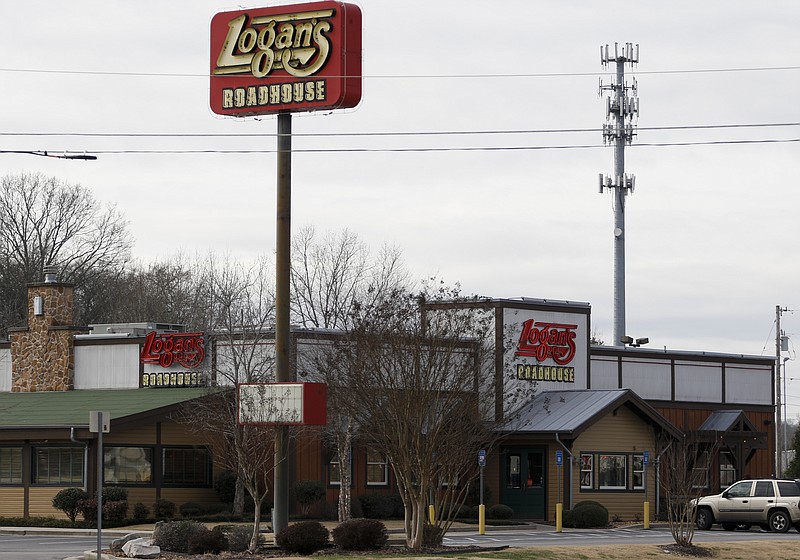When Chloe' Jacks worked as a waitress at the Logan's Roadhouse restaurants in Cleveland, Tenn., and Fort Oglethorpe, Ga., she says she'd spend hours every night rolling silverware inside napkins, restocking and doing other side work while making a server's wage of $2.13 an hour - but not earning any tips.
"Most of the closing work, it would take up to two hours or more, and you're only getting paid $2.13 an hour," said Jacks, 22, who lives with her parents in Cleveland.
Jacks is one of at least a half a dozen Chattanooga-area current and former Logan's employees - and more than 3,000 nationwide - who've joined a class-action lawsuit against the Nashville-based restaurant chain. It alleges Logan's short-changed its employees by having them spend more than 20 percent of their time doing non-tipped side work while clocked in as tipped employees in order to save payroll costs and payroll taxes.
"Logan's enjoyed ill-gained profits at the expense of its employees," says the complaint filed on behalf of Nashville Logan's bartenders Carey Bradford and Cody Bolen in U.S. District Court in Nashville by attorney Gordon E. Jackson of the Memphis firm Jackson, Shields, Yeiser and Holt.
The lawsuit also alleges that Logan's made servers falsely report "phantom tips" during the hours they were only paid $2.13 an hour to make it look like they were being paid the required minimum wage of $7.25 an hour.
Restaurants consider tips part of some employees' salary to get the pay up to the minimum wage. But if a server spends more than 20 percent of the time doing general maintenance and preparation work, he or she is entitled to full minimum wage, under a ruling against Applebee's International that the U.S. Supreme Court upheld in 2012. Applebee's International wound up paying $9.1 million to 5,680 people.
Logan's has a centralized plan, the lawsuit says, that rewards restaurant managers who stay under budget and punishes those who don't - even though the amount budgeted for labor is "inadequate," according to the lawsuit. The plaintiffs charge that the policy forces managers to make servers and bartenders work off the clock.
Logan's denies all the allegations.
"Logan's Roadhouse does not comment on the details of pending litigation as a matter of policy," Logan's spokeswoman Susan Morgenstern said in a statement. "Nonetheless, Logan's does deny the allegations of the lawsuit, and the company has and will continue to defend itself vigorously."
She added, "For many years, it has been Logan's privilege to provide good jobs and benefits to tens of thousands of employees, and to support communities and customers in more than 20 states."
Some 38,000 employees who've worked at the roughly 260 Logan's Roadhouses in 23 states over the past three years are entitled to join the lawsuit, Jackson said. His firm has sent letters to eligible employees and, so far, has gotten more than 3,000 to consent to join, which Jackson said was a high percentage.
"Human nature is they may be very afraid to join a lawsuit," he said.
But Morgenstern said "the vast majority of Logan's' current and former employees have expressed no interest in joining this lawsuit.
"We believe their loyalty is testimony to our concern and commitment to our employees, and confirmation of our compliance with applicable laws," she said.
Jackson's firm created a website, logansofftheclock.com, that lets former and current Logan's employees opt in to the lawsuit and offers examples of how much in back pay and penalties a court ruling could give to a hypothetical Logan's server. For example, a server who did an hour's worth of non-tip work daily while getting $2.13 hourly over the course of three years' employment could be entitled to $7,680, the website says.
It's a lot of work for legal firm to file a class action lawsuit against a restaurant chain, Jackson said, including getting the names of all the potentially affected employees and contacting them. It can take as long as five years, he said, for a class-action lawsuit to run its course.
"A lot of things can happen in these cases," Jackson said. "There's no slam dunk."
Wage lawsuits against restaurants have doubled in the last 10 years in federal courts, according to the Wall Street Journal. The lawsuits fall into two categories, "who gets to share in the tips and what should servers be paid when they're not serving?" journalist Steve Brooks wrote last year in "The Trouble With Tips" in "Restaurant Business" magazine.
Some restaurants have banned tips due to the complexity of tipping rules. The National Restaurant Association has a 16-page guide about tipping.
Jacks now works as a waitress at Hooter's in Chattanooga, which she says doesn't require its servers to do side work.
"We have a person who's paid to do all of it," she said. "It's a lot more put together [than Logan's]."
Contact staff writer Tim Omarzu at tomarzu@timesfreepress.com or www.facebook.com/MeetsForBusiness or twitter.com/meetforbusiness or 423-757-6651.
The Associated Press contributed to this report.
